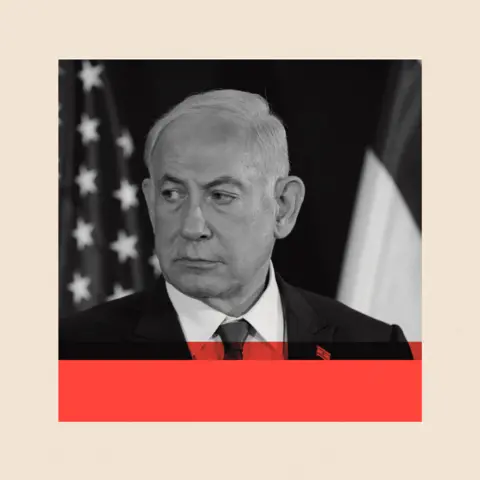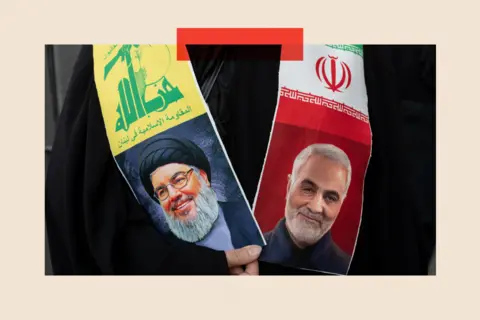What Israel’s latest attacks tell us about Netanyahu’s next move

 Getty Images
Getty ImagesIsrael’s invasion of Lebanon is about to end its second week, as Israel’s war has entered its second year. Calls for a ceasefire have increased following an airstrike in Beirut on Thursday night, and the wounding on Friday, for a second day, of UN peacekeepers in southern Lebanon by Israeli fire.
New attacks are taking place in Jabalia, northern Gaza, despite continued calls for an end to the conflict there. Israel’s allies are also urging people to exercise restraint as the country prepares to retaliate against Iran, following last week’s ballistic missile attack.
However, Israel will continue to pursue its path, and resist this pressure, because of three things: 7 October, Benjamin Netanyahu and the United States.
It was January 2020 when Iranian general Qassem Soleimani arrived at Baghdad airport on a night flight from Damascus. Soleimani was the head of Iran’s notorious Quds Force, a special, secret unit of Iran’s Revolutionary Guards Corps that carries out operations overseas.
This group – its name means Jerusalem, and its main enemy was Israel – was responsible for arming, training, financing and directing the militias participating abroad in Iraq, Lebanon, the Palestinian Territories and beyond. At the time, Soleimani was perhaps the second most powerful man in Iran, after the Supreme Leader, Ayatollah Ali Khamenei.
When Soleimani’s convoy left the airport, it was destroyed by missiles fired at the detectors. that killed him instantly.
 Getty Images
Getty ImagesAlthough Israel provided intelligence to help locate its archenemy, this drone belonged to the United States. The execution order was issued by then US President Donald Trump, not Israeli Prime Minister Benjamin Netanyahu.
“I don’t forget that Bibi Netanyahu let us down,” said former President Trump, speaking about the killing of Soleimani. In a separate interview, Trump also suggested that he expected Israel to play a major role in the attack and lamented that Netanyahu is “willing to fight Iran as America’s last soldier”.
Although Trump’s account is disputed, at the time it was believed that Netanyahu, who praised the assassination, was worried that Israel’s direct involvement could lead to a major attack against Israel, from Iran directly, or its proxies in Lebanon and the Palestinian Territories. Israel was fighting a shadow war with Iran, but each side was careful to keep the fighting within certain limits, for fear of provoking the other into a larger conflict.
Just four years later, in April of this year, the same Benjamin Netanyahu ordered Israeli planes to bomb the Iranian diplomatic compound in Damascus, killing two Iranian generals among others.
Then in July, the prime minister of Israel authorized the killing of Fuad ShukrHezbollah’s top military commander, in an airstrike in Beirut. It is reported that the answer of the current American president was to insult him, according to a new book by Bob Woodward, who says that President Joe Biden was shocked that the Israeli prime minister was willing to escalate the conflict that the White House was trying to bring about. end of months.
“You know, the perception of Israel around the world is increasingly that it’s a rogue state, a violent actor,” President Biden said. he reportedly said.
The same prime minister, said to be the most cautious of any other president of the United States, was then criticized for being too aggressive in his successor.
What separates these two episodes is 7 October 2023 – the bloodiest day in Israel’s history and a political, military and intelligence failure of catastrophic proportions.
What these two times have in common, however, is that Netanyahu violated the will of the American president.
Both of these factors help explain how Israel continues to prosecute the current war.
Israel’s latest hostilities ended a few weeks later, when international pressure mounted so much that the United States insisted on a ceasefire.
The ferocity and scale of Hamas’ attacks against Israel, the impact on Israeli society and its sense of security, meant that this war would remain unlike any recent conflict.
For the US administration pouring billions of dollars worth of weapons into Israel, the Palestinian deaths and suffering in Gaza was deeply uncomfortable, and politically damaging to the administration. For America’s critics in the region, the superpower’s apparent impotence when it comes to influencing the largest recipient of US aid is puzzling.
Even after US airstrikes took part in ending the Iranian attack on Israel in April – a clear sign of how Israel’s security is guaranteed by its main ally – Israel continued to thwart efforts to reform its military.
This summer, Israel chose to escalate its conflict with Hezbollah, without seeking permission from the United States.
As Israel’s longest-serving prime minister, Netanyahu has learned over 20 years that US pressure is something he can withstand, if not ignore. Netanyahu knows that the US, especially in an election year, will not take a step that forces him to deviate from his chosen path (and he believes, in any case, that he is fighting America’s enemies).
Counting exceptions
Especially when it comes to the recent rise, it would be wrong to think that Netanyahu is operating outside of the Israeli political establishment. If there is, the pressure on him to be strong to strike hard against Hezbollah, but also against Iran.
When the plan to end the fighting in Lebanon was proposed by the US and France last month, criticism of this proposed 21-day agreement came from the opposition, as well as the main group of the left in Israel, and the groups of the right.
Israel is determined to continue its wars now, not only because it feels it can withstand international pressure, but also because Israel’s tolerance for the threats it faces has changed after October 7.
Hezbollah has for years stated its intention to attack the Galilee in northern Israel. Now that Israeli society has come to grips with the fact that gunmen enter homes, that threat cannot be ignored, it must be removed.
The way Israelis view danger has also changed. Long-standing notions of military red lines in the region have evaporated. Several actions have been taken over the past year, until recently, which could lead to endless conflict, raining bombs and missiles on Tehran, Beirut, Tel Aviv and Jerusalem.
Israel assassinated the head of Hamas while he was a guest of Iranians in Tehran; it also killed the entire leadership of Hezbollah, including Hassan Nasrallah; killed senior Iranian officials inside an official compound in Syria.
Hezbollah has fired more than 9,000 missiles, rockets and drones at Israeli cities, including ballistic missiles at Tel Aviv. The Iran-backed Houthis in Yemen also fired large-scale missiles at Israeli cities, intercepted by Israeli air defenses as they re-entered the Earth’s atmosphere above central Israel. Iran has not launched two attacks on Israel in the past six months involving more than 500 drones and missiles. Israel invaded Lebanon.
Any of these could, in the past, have resulted in regional war. The fact that they don’t will change how Israel’s normally cautious, risk-averse prime minister decides on his next move.
BBC InDepth is the new home to the website and app for analysis and the best information from our top journalists. Under a brand new brand, we’ll bring you fresh ideas that challenge assumptions, and in-depth reporting on the biggest issues to help you make sense of a complex world. And we’ll be showing thought-provoking content from across BBC Sound and iPlayer too. We’re starting small but thinking big, and we want to know what you think – you can send us your feedback by clicking the button below.
Source link




